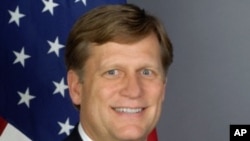For three years, Michael McFaul worked in the White House to promote a “reset’ in relations between the United States and Russia. But within days of arriving in Moscow as Ambassador, he has become the target of some of the harshest anti-American rhetoric since the end of the Cold War.
A group called “Network of Putin Supporters” held a flash mob protest Thursday in front of the U.S. Embassy in Moscow. It was so fast, and now so routine, that it was over before reporters arrived.
In the past month, the embassy has flared up as an issue in Russia’s presidential election campaign.
Prime Minister Vladimir Putin has charged anti-government protesters are in the pay of the U.S. government. Ruling party legislators have said any legislator who enters the U.S. Embassy is a traitor.
On his second day on the job, U.S. Ambassador Michael McFaul was denounced on national television as a man with a secret mission to promote a so-called Arab Spring in Russia.
Inside and outside the embassy, debate rages about whether this is just pre-election politics or the end of the so-called "reset" in bilateral relations.
Carnegie Center analyst in Moscow, Nikolai Petrov, says Mr. Putin is going negative to boost his ratings before the March 4 election.
"The Kremlin now is so much focused on elections, and playing the anti-American card is one of the opportunities that they are trying to exploit,” said Petrov.
Petrov says that with the vote three weeks away, Mr. Putin needs a credible enemy fast.
"The United States being the single superpower is a good candidate to play this role,” said Petrov.
The danger is that the attacks on Ambassador McFaul go straight back to the White House. If the attacks continue after the March 4 election, analysts say President Obama could devote less time to Russian issues, believing the reset if over and his investment of time will yield little payback.
Mr. Putin is expected to win a third term as president in the March elections, either in the first round on March 4 or in a second round, on March 25.
One week after the inauguration on May 7, Russia’s next president is to take his first foreign trip, to Chicago for a combined NATO-Group of 8 meeting. Earlier this week, Mr. Putin told a group of Russian editors that NATO was a Cold War relic that should be dissolved.
Although Barack Obama has been president for three years, he barely knows Mr. Putin. For protocol reasons, almost all the American president’s meetings have been with President Dmitry Medvedev.
During the past three years the two presidents followed the reset policy, working on areas of common ground.
Russia dropped sales of anti-aircraft missiles to Iran and allowed the transshipment of NATO military hardware to Afghanistan. Washington helped Russia win admission to the World Trade Organization.
Mark Feygin and other analysts say the reset is not dead.
He predicts that shortly after the election, Kremlin officials will lower their anti-American rhetoric and try to minimize the damage to U.S.-Russian relations.
And even though Ambassador McFaul is being attacked daily in Russia’s state press, analysts like Petrov believe he has a future in Moscow.
"I do think that Michael McFaul can be very effective,” said Petrov.
Under this scenario, the Cold War rhetoric will melt away, along with February’s snow and ice.
Kremlin attacks on US Embassy: Electioneering or End of Reset?
- By James Brooke










